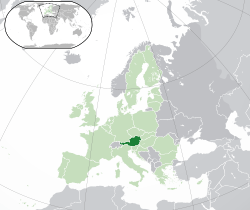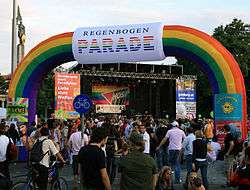LGBT rights in Austria
| LGBT rights in Austria | |
|---|---|
 Location of Austria (dark green) – in Europe (light green & dark grey) | |
| Same-sex sexual intercourse legal status |
Legal since 1971, age of consent equalized in 2002 |
| Gender identity/expression | Transgender people allowed to change gender; surgery not required |
| Military service | LGBT people allowed to serve |
| Discrimination protections | Yes, discrimination protections since 2004 for employment and 2017 for the provision of goods and services (see below) |
| Family rights | |
| Recognition of relationships |
Unregistered cohabitation since 2003, Registered partnership since 2010, Same-sex marriage to become legal from 2019 |
| Adoption | Stepchild adoption since 2013, joint adoption since 2016 |
Lesbian, gay, bisexual, and transgender (LGBT) rights in Austria have advanced significantly in the 21st century. Both male and female same-sex sexual activity are legal in Austria. Registered partnerships were introduced in 2010, giving same-sex couples some of the rights of marriage. Stepchild adoption was legalised in 2013, while full joint adoption was legalised by the Constitutional Court of Austria in January 2015. On 5 December 2017, the Austrian Constitutional Court decided to legalise same-sex marriage. Same-sex marriage will be legal starting on 1 January 2019, unless the Parliament changes the law themselves beforehand.[1]
The country, while influenced by Roman Catholicism, has slowly become more liberal with laws and social opinions concerning sexual orientation and gender identity.
Law regarding same-sex sexual activity
Same-sex sexual acts have been legal since 1971. In 2002, the age of consent was equalized by a court decision from 18 to 14 years of age.[2]
Recognition of same-sex relationships

Following the ruling of the European Court of Human Rights in Karner v. Austria in 2003, cohabitating same-sex couples were given the same rights as cohabitating opposite-sex couples.
First planned in 2007, registered partnerships have been legal in Austria since 1 January 2010.
Before the Constitutional Court decided to legalize same-sex marriage, the Government had not legalised same-sex marriage due to opposition by the Austrian People's Party (ÖVP). The Greens had however introduced a bill in Parliament, and in 2015 a citizens' initiative "Ehe Gleich!" was set up to petition the Parliament to consider the legalisation of same-sex marriage. They also filed a lawsuit challenging the current law, however, it was dismissed by a lower court.[3] A second lawsuit was heard on 21 March 2016 in Linz.[4] On 15 April 2016, a court dismissed the case as well.[5]
On 5 December 2017, the Constitutional Court struck down the ban on same-sex marriage as unconstitutional. Same-sex marriage will become legal on 1 January 2019.[1] In January 2018, the new ÖVP-Chancellor, Sebastian Kurz, said on national television that his new Government will respect the ruling by the Constitutional Court and that same-sex marriage will be legal in Austria by 2019.[6]
Adoption and parenting
On 19 February 2013, the European Court of Human Rights ruled in X and Others v. Austria that a partner in a same-sex union has the right to adopt his or her partner's biological child. On 4 July 2013, the Austrian Parliament passed a government bill that allows stepchild adoption by same-sex couples. The law entered into force on 1 August 2013.[7][8]
In January 2015, the Constitutional Court found the existing laws on adoption to be unconstitutional and ordered the laws to be changed by 31 December 2015 to allow joint adoption by same-sex couples.[9][10] On 30 October 2015, the Justice Minister announced that the ban would no longer be enforced starting on 1 January 2016, thus allowing the Court's decision to automatically cancel the joint adoption ban.[11]
Additionally, lesbian couples can get access to artificial insemination.[12]
Discrimination protections

The federal Labour Code has included anti-discrimination protections on the basis of sexual orientation since 2004, to follow the implementation of EU legislation prohibiting discrimination on that ground. Gender identity and intersex status are not explicitly included, but are perceived as being covered under "gender".[13] In January 2017, Lower Austria (Niederösterreich) became the last Austrian state (Bundesland) to update its anti-discrimination laws to cover sexual orientation in the provision of goods and services.[14] Every other state had already established anti-discrimination laws covering sexual orientation.
The 1993 Police Security Act requires the police to refrain from any actions that could create the impression of bias or that could be perceived as discrimination on the grounds of sexual orientation. Vienna has had its Youth Protection Law since 2002, and one city, Bludenz, has adopted a symbolic non-discrimination declaration which includes sexual orientation in 1998. The Federal Constitution theoretically protects all citizens equally, but several judments of the Constitutional Court have confirmed that these protections are not always enforced.[15][16][17]
In 2015, the Austrian Parliament approved amendments to the Criminal Code, banning hate crimes and hate speeches on the basis of sexual orientation.[14] The changes went into effect on 1 January 2016.
Gender identity and expression
Transgender people in Austria are allowed to change their legal gender and name so that they match their gender identity. They are not obliged to undergo sex reassignment surgery beforehand.[14]
On 14 March 2018, the Constitutional Court preliminarily ruled that intersex people, who are biologically neither male nor female, can choose to have their entry in the birth registry left blank or changed to "inter", "other" or "X". The Court also ruled that intersex medical interventions are not constitutional and should be avoided as much as possible. It ruled that such medical interventions could only be justified in exceptional cases, such as in life-threatening cases. The final judgment was published on 29 June 2018, and entered into force immediately.[18][19]
Military service
Austria permits LGBT people to serve openly in the Austrian Armed Forces.[20]
As of 2014, Austria allowed transgender people to serve openly in its military forces.[21] The policy of inclusion was reportedly still in effect in 2017.[22]
Living conditions
.jpg)

Politics
In 1995, the International Human Rights Tribunal instigated the political discussion about the discrimination and persecution of LGBT persons in Austria. The first major parliamentary debates on that issue took place thereafter, initiated by the Liberal Forum (LIF) which was campaigning strongly against discrimination of homosexuals, which at that time existed through section 209 of the Austrian Penal Code, and for complete equality of treatment also including marriage and adoption. Section 209 set a higher age of consent for gay men, at 18 (instead of 14 for heterosexuals and lesbians). The Social Democrats (SPÖ) and the Green Party at that time showed support for the issue of equal treatment of same-sex couples.
After the LIF did not pass the four percent electoral threshold in the 1999 elections, the Social Democrats and the Green Party started to embrace this issue more. The SPÖ on its biannual Federal Party Convention made a decision on the issue of equal treatment of same-sex couples. They proposed a model of registered partnership ("Eingetragene Partnerschaft") including stepchild adoption. The Austrian Green Party proposed the civil pact ("Zivilpakt") as a somewhat similar model to that of the Social Democrats in 2004.
However, progress was visible to a limited extent. Since 1998, Austria has recognized the right not to testify against their partner if the partner is of the same sex, as amended in the Criminal Code. In June 2002, the Constitutional Court rescinded section 209 of the Criminal Code, which led to the introduction of section 207b as a substitute by the coalition of the conservative ÖVP and the right-wing FPÖ. Section 207b lowered the age of consent for all regardless of sexual orientation to 14 with a close in age exemption of 3 years. It also prohibits corrupting a minor under 16 to have sexual relations. Following the 2003 decision of the European Court of Human Rights in the case of Karner v Austria, cohabiting same-sex partners are entitled to the same rights as unmarried cohabiting opposite-sex partners. In 2005, the Green Party campaigned heavily for registered partnership during the Vienna election campaign in 2005. On 26 July 2006, the first legal same-sex marriage was conducted, when Angelika Frasl, a transsexual woman with two children, was permitted by the Constitutional Court to change her legal gender to female while remaining married to her wife.
Karin Gastinger, the then Minister of Justice and a former member of the centre-right Alliance for the Future of Austria, had fought for gay and lesbian couples to get rights to partners' estates and medical care in December 2005. However, her case was ultimately unsuccessful.[23]
It was not thought likely that the coalition of Conservatives and Social Democrats formed in 2007 would result in major steps towards more equality quickly. Although the then Minister of Justice, Maria Berger, a Social Democrat, intended to improve the situation, she herself expected huge opposition by the conservative coalition partner ÖVP,[24] most likely because her situation was similar to that of her predecessor Gastinger.
Furthermore, Maria Fekter, former chairperson of the parliamentary committee for the judiciary, and former Minister of the Interior, repeatedly announced her opposition to registered same-sex partnerships and that conservative values will prevail. Though, despite such opposition, partnerships were approved in December 2009.[25]
Other, more conservative, political parties include the Austrian People's Party and the Freedom Party tend to oppose LGBT rights.
Controversies

Much speculation has been made about the sexual orientation of Jörg Haider, who took control of the right-wing Freedom Party in 1986 and then later created the more mainstream but still socially conservative Alliance for the Future of Austria.[26] The controversy continued after Haider's death in an accident on 11 October 2008. In 2009, some Austrian publications were forbidden by a court injunction for "breach of personal and privacy rights of Dr Jörg Haider", and thus from making claims that Jörg Haider was not heterosexual.[27]
Gay community
The gay community is developed in all larger cities, such as Vienna, Linz, Innsbruck, Salzburg and Graz. Every year, Vienna organises a gay pride parade, called Regenbogenparade (rainbow parade).
Summary table
| Same-sex sexual activity legal | |
| Equal age of consent | |
| Anti-discrimination laws in employment | |
| Anti-discrimination laws in the provision of goods and services | |
| Anti-discrimination laws in all other areas (incl. indirect discrimination, hate speech) | |
| Anti-discrimination laws concerning gender identity | |
| Same-sex marriage | |
| Recognition of same-sex couples (e.g. unregistered cohabitation, life partnership) | |
| Stepchild adoption by same-sex couples | |
| Joint adoption by same-sex couples | |
| Recognition of adoption for single people regardless of sexual orientation | |
| Automatic parenthood on birth certificates for children of same-sex couples | |
| LGBT people allowed to serve openly in the military | |
| Right to change legal gender | |
| Third gender option | |
| Access to IVF for lesbian couples | |
| Conversion therapy banned by law | |
| Intersex minors protected from invasive surgical procedures | |
| Homosexuality declassified as an illness | |
| Commercial surrogacy for gay male couples | |
| MSMs allowed to donate blood |
See also
References
- 1 2 3 "Der Österreichische Verfassungsgerichtshof - Same-sex marriage". www.vfgh.gv.at. Retrieved 6 June 2018.
- ↑ "RIS Dokument". Ris2.bka.gv.at. Retrieved 4 November 2008.
- ↑ "Verwaltungsgericht lehnt Klage gegen Eheverbot für LGBT ab". thinkoutsideyourbox.net. 21 December 2015.
- ↑ Oberösterreich: Lesbisches Paar und Kind klagen gegen "Eheverbot"
- ↑ "Österreich: Zweite Klage auf Ehe-Öffnung gescheitert". Queer.de. 16 April 2016.
- ↑ Das Erste.de :Kanzler Kurz, Wunderknabe oder politischer Scharfmacher? (german), January 17, 2018.
- ↑ Österreich führt Stiefkindadoption ein – Kirche poltert
- ↑ "Austria becomes the 13th European country to allow same-sex second-parent adoption". ILGA Europe. 1 August 2013. Archived from the original on 29 October 2013.
- ↑ "Adoptionsverbot für homosexuelle Partner aufgehoben". Vienna Online. 14 January 2015.
- ↑ "Österreich: Adoptionsverbot für Homo-Paare verfassungswidrig". Queer.de. 14 January 2015.
- ↑ Homosexuelle dürfen künftig adoptieren – ohne Gesetzesnovelle
- ↑ Fortpflanzungsmedizingesetz im Ministerrat beschlossen
- ↑ (in German) Antidiskriminierungsgesetze in Österreich
- 1 2 3 Rainbow Europe: Austria
- ↑ "RIS Dokument". Ris2.bka.gv.at. Retrieved 4 November 2008.
- ↑ "RIS Dokument". Ris2.bka.gv.at. Retrieved 4 November 2008.
- ↑ "RIS Dokument". Ris2.bka.gv.at. Retrieved 4 November 2008.
- ↑ Intersex persons have the right to adequate entry into civil register
- ↑ Austria: intersex genital mutilation not constitutional – immediate Third gender recognition ordered
- ↑ "Countries that Allow Military Service by Openly Gay People" (PDF). PalmCenter. June 2009. Retrieved 4 December 2009.
- ↑ Elders, M. Joycelyn; Brown, George R.; Coleman, Eli; Kolditz, Thomas A.; Steinman, Alan M. (1 April 2015) [Article first published online 2014]. "Medical Aspects of Transgender Military Service". Armed Forces & Society. 41 (2): 199–220. doi:10.1177/0095327X14545625.
scholars at the Hague Centre for Strategic Studies have published a comprehensive study of rules governing gay, lesbian, bisexual, and transgender service in 103 countries ... we are grateful to its authors, who provided us with their data indicating that 18 nations allow transgender military service ... The 18 confirmed cases are Australia, Austria, Belgium, Bolivia, Canada, Czech Republic, Denmark, Estonia, Finland, France, Germany, Israel, Netherlands, New Zealand, Norway, Spain, Sweden, and United Kingdom.
- ↑ O'Connor, Tim (26 July 2017). "Trump's Transgender Military Ban Leaves Only 18 Countries With Full LGBT Rights in Armed Forces". Newsweek. Retrieved 26 July 2017.
- ↑ Malcolm Thornberry (16 December 2005). "Czech Republic, Austria Move To Legalize Gay Unions". Retrieved 14 August 2011.
- ↑ "Berger im STANDARD-Interview: "Bei Homosexuellen-Ehe etwas mehr zustande bringen" – Nachrichten in Echtzeit auf derStandard.at/Politik/Inland/Nach der Wahl – österreich..." Derstandard.at. Retrieved 4 November 2008.
- ↑ "Austria's parliament legalises civil unions". PinkNews.co.uk. 10 December 2009. Retrieved 11 December 2009.
- ↑ Out magazine, February 2009, Pg. 46 – 51.
- ↑ Newspapers sentenced for “Gay Haider” reports
- ↑ Wer darf Blut spenden?
External links
| Wikimedia Commons has media related to LGBT in Austria. |
- Percy, William A. Austria. Encyclopedia of Homosexuality. Dynes, Wayne R. (ed.), Garland Publishing, 1990. pp. 97–99
- Rainbow Austria
- GayInVienna
- Homosexual Initiative Vienna
- Homosexual Initiative Linz